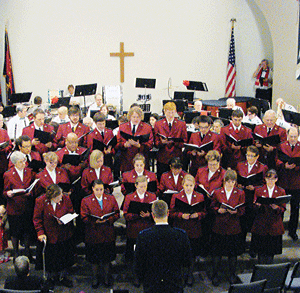the spiceBox
by Sharon Robertson, Lt. Colonel –
The earth trembles and quakes, and cities fall. Ocean waves defy their boundaries, surging inland with remorseless, irresistible force. Powerful super storms rage through by the countryside, razing everything in their paths. Disease rides on the wings of the birds, every year a form new and more virulent. Terrorism, wars declared and undeclared, internecine conflicts that rend the fabric of social organizations great and small, from political to familial, threaten our very existence. The almighty dollar that funded our golden dreams has crumbled into ashes and drifted away on the winds of harsh reality, and with it has gone hope, confidence, optimism, faith in the future and in our place in it. Grief and despondence surrounds us like a dense fog; we cannot see the way, and are too hurt and confused to continue the search for it.
Where is God when you need Him!
Dr. Elizabeth Kubler-Ross in 1969 identified emotions that we all tend to experience as individuals coping with loss: denial – refusing to believe what has occurred; anger – blame-placing, accusing God or others for what has occurred; bargaining – seeking to make a deal with God; depression – feelings of exhaustion, helplessness, guilt, lack of interest in life; acceptance – dealing with loss and moving on, focusing more positively on the future, less past disaster. In the interim since that time this list of “stages of grief” has been extensively reviewed, modified and remodeled, but it remains a useful tool in recognizing and coping with the emotions that make our journey from devastation to wholeness so perplexing, so confusing, so seemingly hopeless.
The Bible also has a lot to say about dealing with the internal forces that overwhelm the victim of a devastatingly collision with his personal universe. Among the most memorable is Job, a man battered by a barrage of personal disasters specifically designed to destroy all that he had, all that he loved … all that he believed in. Job survived his ordeal, but the challenge to his faith was real, a battle of faith versus grief and all its attendant baggage. Long before Kubler-Ross and modern psychology, the author of this amazing book understood and recorded the emotional journey forced upon us by disaster and the need to cope with its results.
Scripture presents the life of Job as a drama played out on the stage of life, a biography of a real person faced with real tragedy, and very real grief, the target of Satan, who hoped to prove a correlation between faith and a personal sense of well-being, or “blessing”. The wealthy, respected patriarch Job tragically loses his children, his material wealth and position, and even the respect of his wife and peers as the result of a series of sudden and devastating disasters. His body is racked by disease, and he is accused of hidden sin in his dealings with others.
Job’s confusion and grief were compounded not only by the betrayal of his friends, but the apparent desertion of his God. Though his faith had been exemplary, a model for others, everything that he valued was gone. He couldn’t believe this was happening to him, God’s faithful servant. He blamed his friends for lacking sympathy and understanding; he was angry with God for failing to protect him, for failing to reward his righteousness with justice; understandably, depression overwhelmed him, and he lamented that he had ever been born. Yet through all this, Job clung stubbornly to his faith in the very God who seemed to have deserted him. His faith was not reasonable; for the time being, it was independent of any perceived rational foundation – he simply and unequivocally believed! As he said, “Though He slay me, yet shall I hope in Him!” (Job 13:15 NIV). “I know that my Redeemer lives, and that in the end he will stand upon the earth. And after my skin has been destroyed, yet in my flesh I will see God; I myself will see him with my own eyes — I, and not another. How my heart yearns within me! (Job 19:25-27 NIV).
It was his stubborn faith, his refusal to “curse God and die,” that brought him to the point of acceptance and restoration. As God helped him to focus, Job found a new sense of his own identity. He was brought to a new realization of how limited was his understanding of his understanding of the person and purposes of God. He was able to “see God” in a new, more satisfying way, and to submit himself to the Lord, not with resignation and defeat, but with new hope for a future bright with the promise of God.













